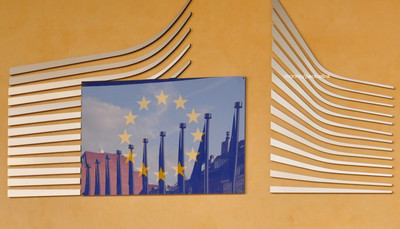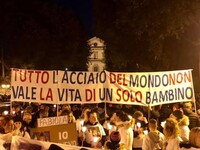Antonia Battaglia, Peacelink, in Commissioni Petizioni del parlamento Europeo
In sede di Commissioni Petizioni del Parlamento Europeo, Peacelink è stata invitata oggi 5 maggio 2015 a presentare un aggiornamento sulla situazione in corso a Taranto.
 Antonia Battaglia ha relazionato con un discorso qui allegato sulle criticità ancora presenti e ha invitato la Commissione Europea a procedere in modo spedito verso la terza fase della procedura di infrazione, lanciata già nel 2013 su denuncia di Peacelink.
Antonia Battaglia ha relazionato con un discorso qui allegato sulle criticità ancora presenti e ha invitato la Commissione Europea a procedere in modo spedito verso la terza fase della procedura di infrazione, lanciata già nel 2013 su denuncia di Peacelink.
Battaglia ha sottolineato come la situazione a Taranto non sia affatto migliorata nel corso degli anni e come, anzi, la nuova legge ILVA penalizzi ulteriormente la popolazione senza risolvere neanche la questione occupazionale.
« Non è possibile sacrificare il diritto alla vita per quello al lavoro e ci sono due strade che si sono presentate davanti allo Stato e ai Governi italiani : la strada della produzione di acciaio, accompagnata rigorosamente da interventi per la messa in sicurezza della popolazione e dell’ambiente ; e la strada della chiusura dello stabilimento per la mancata attuazione di qualsiasi misura atta a proteggere la vita. Siamo adesso in una fase di non ritorno, in cui non solo alcun investimento serio è stato mai attualizzato ma in cui mancano anche le risorse per attualizzarne ».
Dopo l’intervento di Peacelink, il dibatitto in aula ha visto l’eurodeputata danese dei Verdi Margrete Auken prendere la parola a sostegno dei diritti dei tarantini e per una netta e urgente soluzione che dovrebbe essere imposta alle autorità italiane.
L’eurodeputato del M5S Rosa D’Amato si è espressa con grande vigore in sostegno di Antonia Battaglia e ha menzionato alcuni passaggi della storia giudiziaria dell’Ilva, sottolineando l’urgenza che provvedimenti non procrastinabili siano attuati con effetto immediato.
Il deputato socialista francese Edouard Martin ha preso la parola in sostengo delle posizioni di Peacelink, sottolineando come il diritto al lavoro non possa mettere a repentaglio il diritto alla vite e alla salute degli operai e della popolazione.
Peacelink ha in seguito sottolineato, a conclusione degli interventi, che non si deve attendere oltre e che non è possibile continuare a rinviare la soluzione di un problema come quello dell’Ilva perché « non si tratta di diverse interpretazioni della realtà ma di fatti oggettivi di malattia e morte a sostegno dei quali ci sono perizie epidemiologiche e aggiornamenti quali lo studio Sentieri ».
Il Presidente della Commissione Petizioni, Cecilia Wilkström, ha ringraziato Peacelink per aver riportato all’attenzione dei lavori degli addetti questa questione e ha invitato la Commissione Europea, presente in Aula, a fornire una risposta dettagliata sullo stato delle cose in merito alle azioni intraprese a Taranto dalle autorità italiane.
Battaglia ha anche espresso la propria perplessità rispetto alle posizioni prese in aula dall’eurodeputato del PD Cozzolino e dal deputato di Forza Italia Cirio : la inefficacia dell’azione governativa su Taranto è palese e il prezzo viene pagato da migliaia di esseri umani che portano sulle proprie spalle la produzione italiana di acciaio.
Per Peacelink , Antonia Battaglia
al seguente link lintervento e la conseguente discussione
di seguito il testo della lettera
Dear President,
First of all, thank you very much for inviting me today.
It is one year and half since I last had the chance to update the Petition Commission on the situation in my hometown, Taranto, concerning the town's pollution and its effects on population. And I am here today, while many months have passed by, to witness of the fact that the situation has not improved, to say the least.
Many judiciary events have concerned the Ilva plant over the last month. The steel plants in fact been put under governmental administration, through the emanation of a seventh law whose aim it was to ensure that the factory continues producing, as much as possible. The new law, tough, penalises additionally the population because the functioning of the plant is guaranteed while totally dismissing controls and restraining furthermore the environmental permit, that should have represented the strict rule to stick to.
The Italian Government keeps itself outside the respect of European and Italian law, by adopting regulations that represent an attack to the fundamental rights of part of its own population: the right to work yes but not to the detriment of the right to live and breath.
The data on pollution, the ones that Peacelink measures with the same instruments that are used by official bodies, are extremely high, worrying, persistent in their dangerousness, because the situation is as it was many years ago.
Yes, some furnaces are closed but this does not prevent pollution of the air, coming from the many other chimneys and structures of the plant; this does not prevent the sea from being contaminated every day, because of the exhaust pipes severely discharging directly into the sea, for decades and still on-going now.
The governmental special administration of ILVA has decided to provide Taranto with 400 million euros for decontamination, a sum that looks absurd when you consider thatalready 3 years ago Italian Preliminary Judge estimated at around 1.8 billion euros the sum needed to improve the situation.
The environmental permit of ILVA has never been respected over the years, but constantly amended and softened. The ILVA laws have been an escalation of guarantees that the Institutions made to the plant, to keep it functional and to marginalise the action of justice.
There is, clearly, no will on behalf of Italy of resolving the situation and of giving the people of Taranto a better future.
Analysis and pollution tests over the population have never been realised by competent bodies and a lot of what we know today, of the status of health of people, comes from civil society-funded medical and chemical tests.
We have quite a lot of official injunctions produced by ISPRA (an official organ of the Ministry of Environment); we have had un update of the public health institute report on Taranto (Sentieri study, 3 July 2014) , but all of this does not seem to exist, neither does it seem to exercise any effect on who should decide to stop ILVA dangerous production and to finally resolve a too longstanding drama.
All relevant documents, with video and material, have been conveyed to the Commission and to the DG Environment. But the last time that we heard from the Commission was in October 2014, with the launch of the reasoned opinion on the ILVA infringement. In August 2014, Commissioner Potocnik sent a letter to Peacelink to confirm that the Commission was well aware of the situation in Taranto.
It has now been 7 months since the reasoned opinion was issued and the situation gets worse and worse: because if you do not stop polluting, of course the status of environment and people will inevitably deteriorate.
There is no prevention of any disease: people and children are left to their own destiny while we know that consequences of pollution from dioxin, PAH, lead and the othersagents found in Taranto can cause disease and death. In dusts coming from the industrial area, according to the European PPRTR Register, one can find a whole encyclopaedia of toxic agents among which arsenic, mercury, nickel, lead, dioxins, PAH, cobalt and others. The latest Sentieri study calls for urgent action in Taranto because of its dramatic results. The mortality rate for children is extremely high, as well as the disease cases. Cancer, heavy respiratory diseases, diabetes, cardio-vascular pathologies, gynecologic pathologies, children morbidity rate, all is higher in Taranto than in the rest of the country, for all ages and social strata.
What should we be waiting for? What is the solution if Italy has stopped in wanting to change Taranto's future?
Why waiting that more people and children die? Why permitting that environmental disaster, which is already there, can worsen and eventually spread to other Italian regions?
Letting Italy play for time and conceding it more months to means be complicit and to allow that the biggest steel plant in Europe can continue producing while disease and deaths rates grow, while big economical losses in ILVA continue and while its financial stability is totally uncertain, while people pay the highest price of all: life.
There is a small abandoned church inside the vast ILVA territory. It is called Mater Gratiae. It could become the symbol of the re-birth of our people, a new hope of life, symbol of kept promises of the international community to get Taranto out of the present and give it a new dignity and a new immediate future.
Thank you
Articoli correlati
 L'ISS ha sollevato puntuali obiezioni sulla metodologia adottata per la VIS
L'ISS ha sollevato puntuali obiezioni sulla metodologia adottata per la VISE’ stato sottostimato l’impatto sanitario dell'ILVA
Acciaierie d'Italia aveva commissionato uno studio per valutare l'impatto sanitario in uno scenario di 6 e di 8 milioni di tonnellate di acciaio annue sostenendo che grazie all'adozione delle migliori tecnologie le emissioni "post operam" sarebbero rientrate sotto la soglia di rischio.28 febbraio 2025 - Alessandro Marescotti Ha raccontato l'Ilva dal punto di vista delle vittime
Ha raccontato l'Ilva dal punto di vista delle vittimeDomenico Iannacone a Taranto: la vita che si fa racconto
Le storie non esistono se non vengono raccontate. Questo è il cuore del suo lavoro: portare alla luce le esistenze sommerse, le lotte quotidiane, i dolori nascosti ma condivisi. Ha la capacità di entrare in punta di piedi nelle vite degli altri e di restituirle con rispetto e profondità.27 febbraio 2025 - Alessandro Marescotti L'unguento che lenisce le affezioni delle vie respiratorie con un tocco di polveri sottili e benzene
L'unguento che lenisce le affezioni delle vie respiratorie con un tocco di polveri sottili e benzeneIl balsamo d’acciaio che tutela l’ambiente
I 400 milioni che erano destinati alla tutela ambientale e alla bonifica delle aree contaminate vengono dirottati per sostenere la produzione dell’ILVA. Il DDL 1359 evidenzia che "il rischio chiusura dello stabilimento sia quello più rilevante e significativo anche dal punto di vista ambientale".13 febbraio 2025 - Alessandro Marescotti Trasferiti fondi dalle bonifiche ambientali alla produzione di acciaio ILVA
Trasferiti fondi dalle bonifiche ambientali alla produzione di acciaio ILVAGrazie Meloni!
Da Vicks VapoRub a ILVA VapoRub, il nuovo unguento per uso inalatorio è pronto per tutti i bambini di Taranto. Il governo stanzia 400 milioni per questo trattamento balsamico nelle affezioni delle vie respiratorie. La motivazione è che chiudere l'ILVA provocherebbe un "rilevante rischio ambientale".12 febbraio 2025 - Alessandro Marescotti
Sociale.network